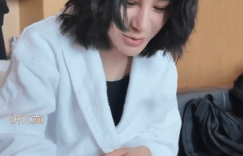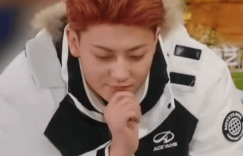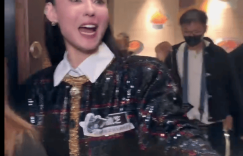On the evening of August 23rd, the Chongqing Chongyan Yubei Cultural Theatre was aglow with light and excitement as a special concert themed around "Chinese Art Songs - The Songs of Bai Shi Dao Ren" took center stage.
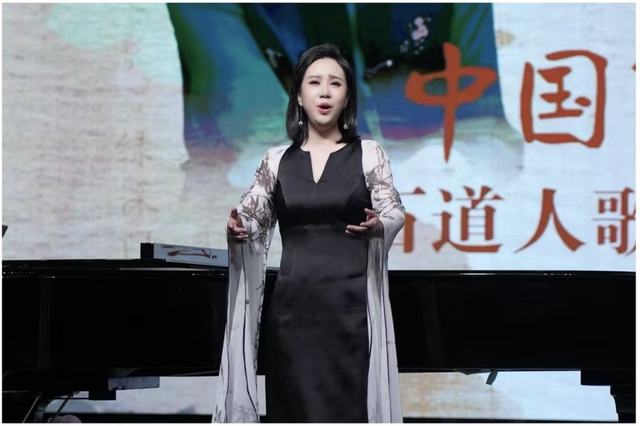
The evening's event was a unique concert experience, "Huang Lu in Concert: The Songs of Bai Shi Dao Ren."
Following the Southern Song Dynasty's relocation, a period of relative peace ensued after a treaty with the Jin. This allowed the people of the South to rebuild their lives, and it was during this time that a remarkable poet, Jiang Kui, emerged onto the literary scene.
Jiang Kui, known by his courtesy name Yaozhang and his pseudonym Bai Shi Dao Ren, was born in 1155. Despite a life of poverty and hardship, he never achieved official status but traveled extensively, relying on his calligraphy and the kindness of friends for sustenance. In his thirties, he gained recognition from Xiao Dezhao and formed friendships with renowned poets like Yang Wanli and Fan Chengda. Although he remained a commoner throughout his life, his mastery of music and poetry earned him high praise. His compositions were noted for their adherence to musical structure and their emotional depth, setting a new standard for lyrical refinement that complemented the bold style of Xin Qiji, creating a dual peak in Southern Song poetry.
The songs attributed to Jiang Kui, also known as "The Songs of Bai Shi Dao Ren," are the only surviving examples of Song Dynasty lyrical music. Annotated with ancient symbols indicating pitch, these works have been adapted into various modern scores based on traditional melodies and tonalities. The selections performed at tonight's concert are taken from the edition compiled by the late musicologist Yang Yinliu.
In her first solo concert dedicated entirely to Jiang Kui's repertoire, the young soprano Huang Lu presented a captivating musical journey through time. This is believed to be the first concert ever to feature a full program of Jiang Kui's songs within the genre of Chinese art song.
Huang Lu, with her exceptional vocal technique and profound artistic sensibility, delivered an unforgettable performance. The concert featured twelve art songs adapted from Jiang Kui's classical lyrics, each imbued with a timeless elegance and rich cultural heritage. Accompanying her on piano was Guo Ziqian.
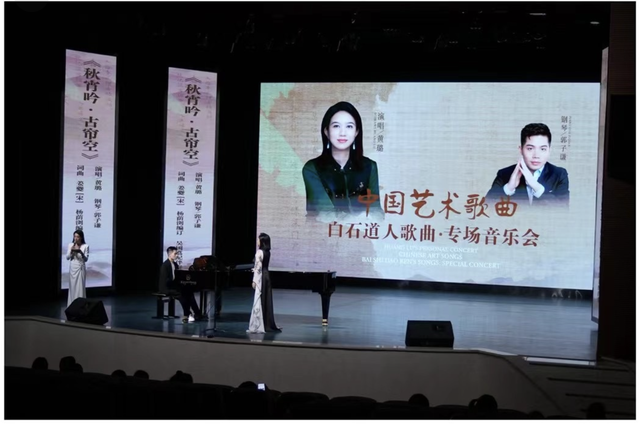
The concert began with "Xing Huatian Ying - Green Silk Gently Brushes Over the Pond," where Huang Lu's clear and penetrating voice seamlessly blended the imagery of spring with a subtle sense of longing, transporting the audience to a tranquil water town in the South.
As the evening progressed, "Jiao Zhao" and "Cui Lou Yin" were performed with a range of emotional intensity, showcasing Huang Lu's ability to capture the essence of each song. Her interpretation was not just a display of vocal prowess, but a deep understanding of the poetic landscapes, infusing each line with vitality.
In "Qiu Xiao Yin - Ancient Curtain Empty," she conveyed the autumn night's solitude and nostalgia with a touch of melancholy, evoking a poignant response. "Yang Zhou Man - Huai Left Famous City" depicted the grandeur and subtlety of historical Yangzhou, with Huang Lu's performance elevating the emotional impact to its zenith.
"Xi Hong Yi - Bamboo Pillow Inviting Coolness" and "An Xiang - Old Moonlight" were among the other pieces that she interpreted with her signature artistry, perfectly capturing the mood and meaning of the lyrics. Her performance was both a tribute to classical poetry and a thoughtful reflection of contemporary aesthetic sensibilities.
Nearing the end, Huang Lu sang "Zui Yin Shang Xiao Pin" and "Qi Liang Fan - Green Willow Lane Filled with Autumn Wind," concluding the concert with songs that were both musically distinctive and emotionally profound. Her performance left the audience deeply moved by the enduring allure of Chinese classical culture.
As the final notes of "Ge Xi Mei Ling" echoed through the hall, the audience erupted into thunderous applause. Many expressed how Huang Lu's performance had enriched their appreciation of Chinese art songs and deepened their connection to traditional Chinese culture.
The success of "The Bai Shi Dao Ren Songs Concert" not only highlighted Huang Lu's remarkable talent as a young soprano but also contributed to the ongoing legacy of Chinese classical art songs. It is expected that Ms. Huang will continue to enchant audiences with her exquisite voice and profound artistry in the years to come.

